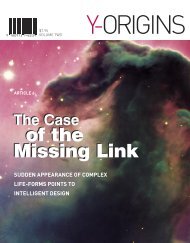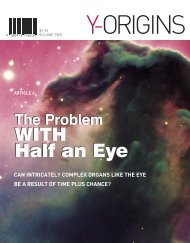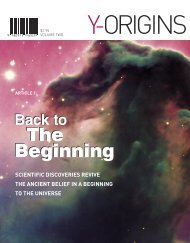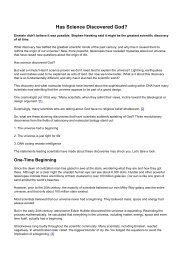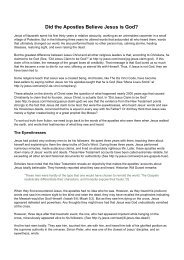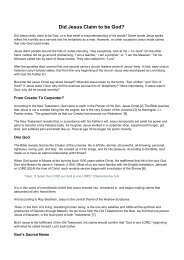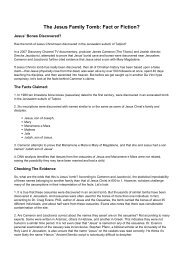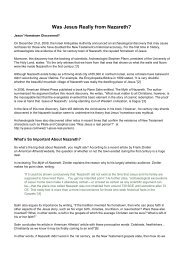1889
Create successful ePaper yourself
Turn your PDF publications into a flip-book with our unique Google optimized e-Paper software.
The Gnostic Gospels: Are they the real history of Jesus?<br />
Are There Secret Writings About Jesus?<br />
In 1945 a discovery was made in Upper Egypt, near the town of Nag Hammadi. Fifty-two copies of ancient<br />
writings, called the Gnostic gospels were found in 13 leather-bound papyrus codices (handwritten books). They<br />
were written in Coptic and belonged to a library in a monastery.<br />
A few Gnostic scholars have gone so far as to assert that these recently discovered writings are the authentic<br />
history of Jesus instead of the New Testament. But does their faith in these documents square with the historical<br />
evidence? Let’s take a deeper look to see if we can separate truth from fiction.<br />
Secret “Knowers”<br />
The Gnostic gospels are attributed to a group known as (big surprise here) the Gnostics. Their name comes from<br />
the Greek word gnosis, meaning “knowledge.” These people thought they had secret, special knowledge hidden<br />
from ordinary people.<br />
As Christianity spread, the Gnostics mixed some doctrines and elements of Christianity into their beliefs,<br />
morphing Gnosticism into a counterfeit Christianity. Perhaps they did it to keep recruitment numbers up and make<br />
Jesus a poster child for their cause. However, for their system of thought to fit with Christianity, Jesus needed to<br />
be reinvented, stripped of both his humanity and his absolute deity.<br />
In The Oxford History of Christianity John McManners wrote of the Gnostics’ mixture of Christian and mythical<br />
beliefs.<br />
Gnosticism was (and still is) a theosophy with many ingredients. Occultism and oriental mysticism became fused<br />
with astrology, magic. … They collected sayings of Jesus shaped to fit their own interpretation (as in the Gospel of<br />
Thomas), and offered their adherents an alternative or rival form of Christianity.[1]<br />
Early Critics<br />
A mild strain of Gnostic philosophy was already growing in the first century just decades after the death of Jesus.<br />
The apostles, in their teaching and writings, went to great lengths to condemn these beliefs as being opposed to<br />
the truth of Jesus, to whom they were eyewitnesses.<br />
Check out, for example, what the apostle John wrote near the end of the first century:<br />
Who is the great liar? The one who says that Jesus is not the Christ. Such people are antichrists, for they<br />
have denied the Father and the Son. (1 John 2:22, NIV).<br />
Following the apostles’ teaching, the early church leaders unanimously condemned the Gnostics as a cult.<br />
Church father Irenaeus, writing 140 years before the Council of Nicaea, confirmed that the Gnostics were<br />
condemned by the church as heretics. He also rejected their “gospels.” But, referring to the four New Testament<br />
Gospels, he said, “It is not possible that the Gospels can be either more or fewer in number than they are.”[2]<br />
Christian theologian Origen wrote this in the early third century, more than a hundred years before Nicaea:<br />
I know a certain gospel which is called “The Gospel according to Thomas” and a “Gospel according to<br />
Matthias,” and many others have we read—lest we should in any way be considered ignorant because of<br />
those who imagine they possess some knowledge if they are acquainted with these.<br />
Nevertheless, among all these we have approved solely what the church has recognized, which is that
only four gospels should be accepted.[3]<br />
Mystery Authors<br />
When it comes to the Gnostic gospels, just about every book carries the name of a New Testament character: the<br />
Gospel of Philip, the Gospel of Peter, the Gospel of Mary, and so on. But were they even written by their<br />
purported authors? Let’s take a look.<br />
The Gnostic gospels are dated about 110 to 300 years after Christ, and no credible scholar believes any of them<br />
could have been written by their namesakes. In James M. Robinson’s comprehensive The Nag Hammadi Library,<br />
we learn that the Gnostic gospels were written by “largely unrelated and anonymous authors.”[4]<br />
New Testament scholar Norman Geisler writes, “The Gnostic writings were not written by the apostles, but by<br />
men in the second century (and later) pretending to use apostolic authority to advance their own teachings. Today<br />
we call this fraud and forgery.”[5]<br />
Mystery Versus History<br />
The Gnostic gospels are not historical accounts of Jesus’ life but instead are largely esoteric sayings, shrouded in<br />
mystery, leaving out historical details such as names, places, and events. This is in striking contrast to the New<br />
Testament Gospels, which contain innumerable historical facts about Jesus’ life, ministry, and words.<br />
Who would you be more likely to believe—someone who says, “Hey, I’ve got some secret facts that were<br />
mysteriously revealed to me,” or someone who says, “I’ve searched all the evidence and history and here it is for<br />
you to make up your mind on”? Keeping that question in mind, consider the following two statements, the first<br />
from the Gnostic Gospel of Thomas (c. 110-150 A.D.) and the second from the New Testament’s Gospel of Luke<br />
(c. 55-70 A.D.).<br />
These are the hidden sayings that the living Jesus spoke and Judas Thomas the Twin recorded.[6]<br />
Many people have written accounts about the events that took place among us. They used as their<br />
source material the reports circulating among us from the early disciples and other eyewitnesses of<br />
what God has done in fulfillment of his promises. Having carefully investigated all of these<br />
accounts from the beginning, I have decided to write a careful summary for you, to reassure you of<br />
the truth of all you were taught. (Luke 1:1-4, NLT)<br />
Do you find the open and aboveboard approach of Luke appealing? And do you find the fact that it was written<br />
closer to the original events to be in favor of its reliability? If so, that’s what the early church thought as well.<br />
And most scholars concur with the early church’s view that the New Testament is the authentic history of Jesus.<br />
New Testament scholar Raymond Brown has said of the Gnostic gospels, “We learn not a single verifiable new<br />
fact about the historical Jesus’ ministry, and only a few new sayings that might possibly have been his.”[7]<br />
Thus, even though the Gnostic writings have impressed some scholars, their late dating and questionable<br />
authorship can’t compare with the New Testament. Such contrast between the New Testament and the Gnostic<br />
writings is devastating to those pushing conspiracy theories. New Testament historian F. F. Bruce wrote, “There<br />
is no body of ancient literature in the world which enjoys such a wealth of good textual attestation as the New<br />
Testament.”[8]<br />
Did Jesus Really Rise From The Dead?
The greatest question of our time is “Who is the real Jesus Christ?” Was he just an exceptional man, or was he<br />
God in the flesh, as Paul, John, and his other disciples believed?<br />
The eyewitnesses to Jesus Christ actually spoke and acted like they believed he physically rose from the dead<br />
after his crucifixion. If they were wrong then Christianity has been founded upon a lie. But if they were right, such<br />
a miracle would substantiate all Jesus said about God, himself, and us.<br />
But must we take the resurrection of Jesus Christ by faith alone, or is there solid historical evidence? Several<br />
skeptics began investigations into the historical record to prove the resurrection account false. What did they<br />
discover?<br />
Was There A “Da Vinci” Conspiracy?<br />
“Mona Lisa’s Smirk” investigates the world’s leading conspiracy theory about Jesus Christ. Were Jesus and<br />
Mary Magdalene married? Did Constantine order the destruction of the true records of Jesus Christ reinventing<br />
him into the God Christians worship today? (See http://y-jesus.com/wwrj/2-da-vinci-conspiracy)<br />
Did Jesus Say What Happens After We Die?<br />
If Jesus really did rise from the dead, then he must know what is on the other side. What did Jesus say about the<br />
meaning of life and our future? Are there many ways to God or did Jesus claim to be the only way? Read the<br />
startling answers in “Why Jesus?” at http://y-jesus.com/wwrj/7-jesus-relevant-today.<br />
Can Jesus Bring Meaning To Life?<br />
“Why Jesus” looks at the question of whether or not Jesus is relevant today. Can Jesus answer the big questions<br />
of life: “Who am I?” “Why am I here?” And, “Where am I going?” Dead cathedrals and crucifixes have led some<br />
to believe that he can’t, and that Jesus has left us to cope with a world out of control. But Jesus made claims<br />
about life and our purpose here on earth that need to be examined before we write him off as uncaring or<br />
impotent. This article examines the mystery of why Jesus came to earth. (See<br />
http://y-jesus.com/wwrj/7-jesus-relevant-today.)<br />
Endnotes<br />
1. John McManners, ed., The Oxford History of Christianity (New York: Oxford University Press, 2002), 28.<br />
2. Darrell L. Bock, Breaking the Da Vinci Code (Nashville: Nelson, 2004), 114.<br />
3. Bock, 119-120.<br />
4. Ibid.,13.<br />
5. Norman Geisler and Ron Brooks, When Skeptics Ask (Grand Rapids, MI: Baker, 1998), 156.<br />
6. Quoted in Robinson, 126.<br />
7. Quoted in Lutzer, 32.<br />
8. Quoted in Josh McDowell, The New Evidence that Demands a Verdict(San Bernardino, CA: Here’s Life,<br />
1999, 37.)<br />
Permission to reproduce this article: Publisher grants permission to reproduce this material without written<br />
approval, but only in its entirety and only for non-profit use. No part of this material may be altered or used out of<br />
context without publisher’s written permission. Printed copies of this article and Y-Origins and Y-Jesus magazine<br />
may be ordered at: http://jesusonlineministries.com/resources/products/<br />
© 2012 JesusOnline Ministries. This article is a supplement to Y-Jesus magazine by Bright Media Foundation &
Powered by TCPDF (www.tcpdf.org)<br />
B&L Publications: Larry Chapman, Chief Editor.





